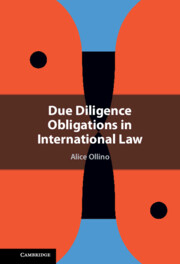15 results
5 - The Proceduralisation of Due Diligence Obligations
-
- Book:
- Due Diligence Obligations in International Law
- Published online:
- 24 February 2022
- Print publication:
- 03 March 2022, pp 232-265
-
- Chapter
- Export citation
2 - The Nature of Due Diligence Obligations
-
- Book:
- Due Diligence Obligations in International Law
- Published online:
- 24 February 2022
- Print publication:
- 03 March 2022, pp 64-130
-
- Chapter
- Export citation
4 - Due Diligence Obligations in the Law of International Responsibility
-
- Book:
- Due Diligence Obligations in International Law
- Published online:
- 24 February 2022
- Print publication:
- 03 March 2022, pp 187-231
-
- Chapter
- Export citation
Copyright page
-
- Book:
- Due Diligence Obligations in International Law
- Published online:
- 24 February 2022
- Print publication:
- 03 March 2022, pp iv-iv
-
- Chapter
- Export citation
Dedication
-
- Book:
- Due Diligence Obligations in International Law
- Published online:
- 24 February 2022
- Print publication:
- 03 March 2022, pp v-vi
-
- Chapter
- Export citation
Bibliography
-
- Book:
- Due Diligence Obligations in International Law
- Published online:
- 24 February 2022
- Print publication:
- 03 March 2022, pp 273-293
-
- Chapter
- Export citation
Contents
-
- Book:
- Due Diligence Obligations in International Law
- Published online:
- 24 February 2022
- Print publication:
- 03 March 2022, pp vii-xi
-
- Chapter
- Export citation
Introduction
-
- Book:
- Due Diligence Obligations in International Law
- Published online:
- 24 February 2022
- Print publication:
- 03 March 2022, pp 1-16
-
- Chapter
- Export citation
Acknowledgements
-
- Book:
- Due Diligence Obligations in International Law
- Published online:
- 24 February 2022
- Print publication:
- 03 March 2022, pp xii-xii
-
- Chapter
- Export citation
1 - The Foundations of Due Diligence in International Law
-
- Book:
- Due Diligence Obligations in International Law
- Published online:
- 24 February 2022
- Print publication:
- 03 March 2022, pp 17-63
-
- Chapter
- Export citation
Abbreviations
-
- Book:
- Due Diligence Obligations in International Law
- Published online:
- 24 February 2022
- Print publication:
- 03 March 2022, pp xiii-xiv
-
- Chapter
- Export citation
Conclusion
-
- Book:
- Due Diligence Obligations in International Law
- Published online:
- 24 February 2022
- Print publication:
- 03 March 2022, pp 266-272
-
- Chapter
- Export citation
Index
-
- Book:
- Due Diligence Obligations in International Law
- Published online:
- 24 February 2022
- Print publication:
- 03 March 2022, pp 294-302
-
- Chapter
- Export citation
3 - The Scope and Content of Due Diligence Obligations
-
- Book:
- Due Diligence Obligations in International Law
- Published online:
- 24 February 2022
- Print publication:
- 03 March 2022, pp 131-186
-
- Chapter
- Export citation

Due Diligence Obligations in International Law
-
- Published online:
- 24 February 2022
- Print publication:
- 03 March 2022



